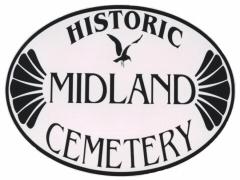 Slavery
to
Slavery
tofreedom
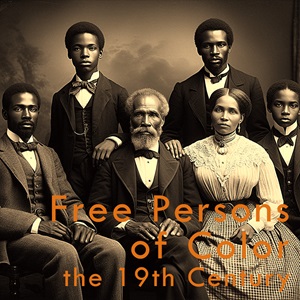

Vibrant Black communities arise
from the ashes of slavery
Midland Cemetery
A Recovered African American Cemetery in Swatara Township
A Recovered African American Cemetery in Swatara Township
Midland Cemetery was rescued from neglect by Steelton historian Barbara B. Barksdale, who began the Friends of Midland organization. That organization is the best source of information on the cemetery. They can be contacted at the following address: Friends of Midland, P. O. Box 7442, Steelton, Pennsylvania 17113-0442.
View their home page by clicking here. E-mail: Friends
of Midland
Midland is an important burial ground for Steelton, PA. Steelton Borough Website
Located on a hill in a quiet corner of Swatara Township, Midland Cemetery holds the earthly remains of hundreds of African American citizens from Steelton, Pennsylvania, nearby rural areas, and the surrounding communities of Oberlin, Enhaut and Bressler. It is one of two African American cemeteries located in Swatara Township; the other cemetery, William Howard Day, is located a short distance away. Of the two, Midland is the oldest, with burials dating back to the eighteenth century. Until becoming known as Midland, it was referred to variously as "the Colored Cemetery," "the Colored cemetery near Oberlin," "the Mohn Street Cemetery," and "Highland Hill Cemetery." All of these terms appear on older documents about Midland Cemetery. On older maps, it has been shown within the boundaries of both "Oberlin Gardens" and Enhaut.
Midland spreads over three and one-half acres, on land that was once a respectful distance from residences. Homes now border two sides of the cemetery, although it wasn't until recently that 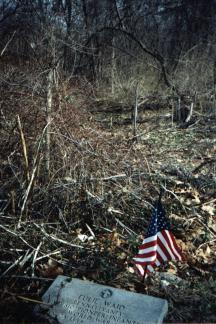 residents of this suburban neighborhood were aware of the extent of the burials across the street from their back yards. Heavy brush and weeds, from more than thirty years of neglect, had obscured all but a handful of grave markers and tombstones from view. Only the most prominent gravestones along the southern and western boundaries of the cemetery gave any hint of the history that was beneath the tangle of brambles, sumac and woody undergrowth that covered the hill behind them.
residents of this suburban neighborhood were aware of the extent of the burials across the street from their back yards. Heavy brush and weeds, from more than thirty years of neglect, had obscured all but a handful of grave markers and tombstones from view. Only the most prominent gravestones along the southern and western boundaries of the cemetery gave any hint of the history that was beneath the tangle of brambles, sumac and woody undergrowth that covered the hill behind them.
Once fully obscured, the grave of World War I veteran Eulie Waid is now clear of major brush and is regularly decorated with an American flag. Waid, who lived January 25, 1895 to November 30, 1951, served as a private with the 810th Pioneer Infantry.
Midland cemetery was rescued from the rampant underbrush by Barbara B. Barksdale, who is now president of the Friends of Midland organization. The organization recently celebrated the inclusion of Midland Cemetery as a site on the National Register of Historic Places.
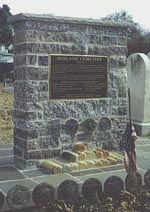 Midland Memorial, left.
Midland Memorial, left.
The plaque reads: "The resting place of African Americans from the villages of Oberlin, Enhaut, Bressler (Swatara Township), Steelton and surrounding areas. They were the leaders of the Black community churches and civic organizations who came out of slavery to freedom. Here rest the veterans of the Civil War, Spanish American War, World War I, II and the Korean War.
"The rich histories of many untold stories are preserved through the restoration and preservation efforts of the 'Friends of Midland' and the cooperation of Swatara Township, Dauphin County Commissioners and the Dauphin County Prison.
"Barbara Barksdale, Founder (FoM), President
"Sharon Harris, Vice President
"Zane Phoenix Sr., Secretary
"Lonnie Dodd, Treasurer
"Etta Payne, Assistant Treasurer
"Clayton Carelock, Research Coord. (click here
for Mr. Carelock's story)
"Anita Hanna Matthews
"Lucille Phoenix
"Calvin Johnson
"Recognized as a historical site by the Swatara Township Commissioners on February 3, 1999."
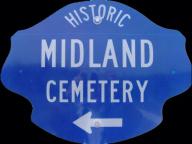 In Boyd's 1919 Directory of Harrisburg and Steelton, Midland Cemetery is listed with the office of its trustees, S.F. and A.W. Dunkle, at 126 N. Front Street. That address was the business of Dunkle and Knoderer Undertaking Company, of which, Amos W. Dunkle was the secretary and treasurer. Samuel F. Dunkle had been in the real estate business with his brother Amos and father Josiah in the 1890's, at J.A. Dunkle and Sons & Company, 192 N. Front Street. Samuel was a Justice of the Peace, and no doubt handled the legal matters both for his family's real estate business and later, as trustee, for Midland cemetery.
In Boyd's 1919 Directory of Harrisburg and Steelton, Midland Cemetery is listed with the office of its trustees, S.F. and A.W. Dunkle, at 126 N. Front Street. That address was the business of Dunkle and Knoderer Undertaking Company, of which, Amos W. Dunkle was the secretary and treasurer. Samuel F. Dunkle had been in the real estate business with his brother Amos and father Josiah in the 1890's, at J.A. Dunkle and Sons & Company, 192 N. Front Street. Samuel was a Justice of the Peace, and no doubt handled the legal matters both for his family's real estate business and later, as trustee, for Midland cemetery.
Another Dunkle, Abraham, ran a furniture and carpet store at 120-126 N. Front Street in the early 1890's. By 1897 Josiah Dunkle had died and his son Samuel had established Dunkle & Company, furniture and carpets, at 124 N. Front Street, managed by Abraham Dunkle. A clerk at the store, D. Frank Knoderer, came from a family of carpenters. During the next two decades, the two families combined their trades and business interests to establish Dunkle and Knoderer Undertaking Company at the location of the old furniture store.
